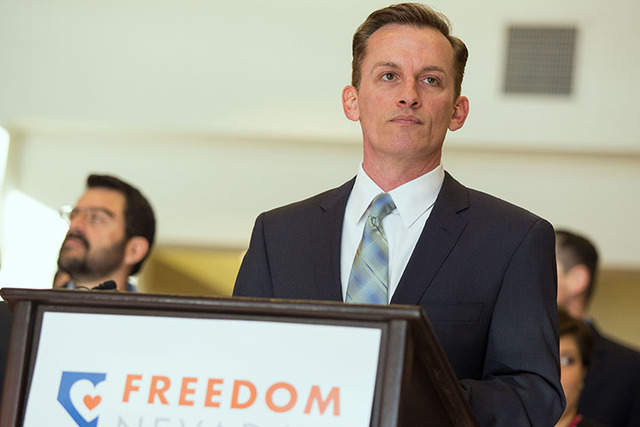ACLU calls for D.A. to stop paying witnesses’ rent
The ACLU of Nevada on Friday called for Clark County prosecutors to stop paying for witnesses’ rent.
Tod Story, executive director of the American Civil Liberties Union of Nevada, said the revelation that the district attorney’s office has a fund to dole out rent money, among other oddities such as covering a cellphone bill or computer classes, raises too many questions that must be answered.
“There definitely has to be an investigation into this,” Story said. “This practice needs to be stopped immediately or suspended.”
Public records obtained by the Las Vegas Review-Journal show the D.A.’s office has been helping witnesses make ends meet — in some cases shelling out more than $1,000 for a victim’s bills — for nearly a decade.
Story on Friday also called for the Nevada attorney general to investigate. The county could probe the practice, he said, but it may be too close to the issue.
The ACLU’s call to action follows those issued by leading legal experts, Las Vegas attorneys and the Clark County public defender who also called for an investigation.
District Attorney Steve Wolfson has contended that the rare payments are authorized by state law.
In response to the ACLU’s demand that the practice be halted, Wolfson said in a statement: “The District Attorney’s policies and procedures regarding the various forms of assistance to crime victims is under review. Very few resources are available in situations where crime victims often have nowhere else to turn. The D.A.’s office will continue to provide assistance where and when appropriate.”
Nevada Attorney General Catherine Cortez Masto’s office said in a statement Friday that questions about a county fund should be addressed by a county audit. Courts can address questions about prosecutors’ obligations.
“This office exclusively defends such petitions filed in the United States District Court, District of Nevada, and will evaluate each petition on a case by case basis,” the attorney general’s statement said.
Wolfson has been in office 2½ years. He requested in fall 2013 an audit of the office’s process for compensating witnesses for coming to court. The audit, completed in May, came after it came to light the D.A.’s office kept shoddy records of vouchers used to pay court fees, travel expenses, mileage and meals.
Story said Friday it was odd that something beyond reimbursement of the expense of coming to court and a per diem to cover food would be allowed.
The first question that must be answered, he said, is whether these payments were done to ensure testimony.
Story said he was disturbed by the emails uncovered in the Review-Journal investigation, which include statements about how not helping a witness out could harm a case.
Payments were made out of an account the district attorney’s office contends is authorized by state law.
The Clark County D.A.’s office created a checking account in 1989, Chief Deputy District Attorney Thomas Carroll said, in response to Nevada Revised Statute 4.3755. It allows money collected for restitution to go into a fund for “victims of crime created by the office of the district attorney of the county in which the court is located.”
Nevada law requires witnesses to be compensated for actual costs of coming to court. Paying for testimony is prohibited, as it could push witnesses to tailor their stories.
The Review-Journal investigation, which looked at records starting in 2004 up to now, showed the D.A.’s office authorized payments in 68 different instances from a checking account maintained by its Victim/Witness Assistance Center. The center coordinates witness travel, updates victims on case statuses and refers victims to outside help. The district attorney’s office redacted case numbers and other information, so it’s unclear how many different cases are linked to the payments.
The Review-Journal has found one instance when a payment was disclosed during testimony.
The payments are rare considering the caseload the district attorney handles, which averages about 65,000 cases a year.
The district attorney’s office says its numbers show there were a total of 56 Victim/Witness payments. Of those, 49 were for rent relocation assistance, and seven fell into the “other” category.
Assistance typically comes in the form of a one-time check payment to a landlord, Carroll said. The Review-Journal’s investigation reflected the assertion.
The D.A.’s office count did not include voided payments. The Review-Journal’s analysis did.
Contact Bethany Barnes at bbarnes@reviewjournal.com or 702-477-3861. Find her on Twitter: @betsbarnes.





























